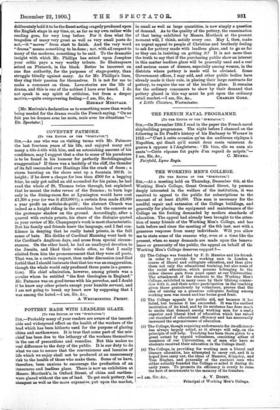COVENTRY PATMORE.
[To THE EDITOR OF THE "SPECTATOR."] Stit,—As one who was on visiting terms with Mr. Patmore the last fourteen years of his life, and enjoyed many and many a tete-a-tete with him, and an astonishing amount of his confidence, may I suggest that a clue to some of his paradoxes is to be found in his humour for perfectly Brobdingnagian exaggeration? If there was a landslip of the cliff, the thunder of its fall resounded over Hastings like the crack of doom ; a storm bursting on the shore sent up a fountain 300 ft. in height ; if he drew a cheque for less than £300 for a begging friar, he only got called an old scoundrel for his pains; he had read the whole of St. Thomas twice through, but explained that he meant the index rerun of the Summa ; to burn logs only in the dining-room fire at Lymington would have cost £1,300 a year (or was it £13,000?); a certain firm made £3,000 a year profit on articles-de piste ; the abstract Church was indeed as a knight riding in the sunshine, but the concrete as the grotesque shadow on the ground. Accordingly, after a quarrel with certain priests, his share of the dialogue quoted in your review of Mr. Champneys's work is most characteristic. But his family and friends knew the language, and I feel con- fidence in denying that he really hated priests, in the full sense of hate. His dislike of Cardinal Manning went back to the Cardinal's Anglican days, and arose from special circum- stances. On the other hand, he had an unalloyed devotion to the Jesuits, and liked their whole ethos, so that I easily elicited from him the pronouncement that they were all poets. That was, in a certain respect, then under discussion (and God forbid that I should insinuate that that too was an exaggeration, though the whole world only produced three poets in a genera- tion). His chief admiration, however, among priests was a secular whom he entitled " the first theologian in England." Mr. Patmore was on good terms with his parochus, and I doubt if he knew any other priests except your humble servant, and
I am not going to break my heart now by supposing that I was among the hated.—I am, Sir, &c.,
A WESTMINSTER PRIEST.






































 Previous page
Previous page